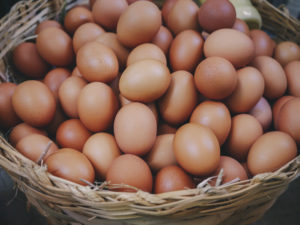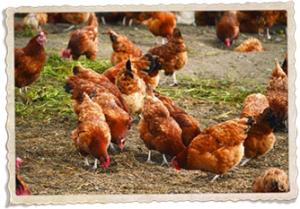When you head to the grocery store, you’ll likely see many varieties of eggs. You’ll see white eggs and brown eggs, cage-free and pasture-raised, and more. Another distinction you’ll notice is the size of the eggs. Chicken eggs can come in many sizes, but the USDA recognizes only six weight classes. Read on to learn more:
The Six Weight Classes
As previously stated, the USDA recognizes six weight classes for chicken eggs. What does this mean? Essentially, the USDA categorizes egg size based on their weight in ounces. However, they do not regulate the individual weight of each egg, but rather the weight per dozen eggs. As such, the six weight classes are as follows:
- Peewee Eggs: These eggs must be a minimum of 15 ounces per dozen. They typically come from young chickens who are not yet laying consistently. Pewee eggs are not usually sold in grocery stores.
- Small Eggs: Small eggs weight a minimum of 18 ounces per dozen. They are also called “pullet eggs,” as these eggs come from pullets. Like peewee eggs, they’re not usually sold in stores.
- Medium Eggs: Weighing a minimum of 21 ounces per dozen, these are the smallest eggs you’ll be able to find in grocery stores.
- Large Eggs: These weigh at least 24 ounces per dozen and are the most commonly found egg in grocery stores. This is the size that most recipes call for, even if they don’t specify the size.
- Extra-large Eggs: These eggs must be a minimum of 27 ounces per dozen. Slightly larger than large eggs, extra-large eggs are sometimes called for in specific recipes.
- Jumbo Eggs: A minimum of 30 ounces per dozen, jumbo eggs weigh more than 20% larger than large eggs. They are hard to find in grocery stores, but not as rare as peewee or small eggs.
What Impacts Egg Size?
Egg sizes are determined by a variety of factors. These include the following:
- Age of the Chicken
- Weight of the Chicken
- Breed
- Diet
- Living Conditions
Generally speaking, the older and larger a chicken is, the bigger the eggs. However, certain breeds are also more likely to produce large eggs, such as New Hampsire Reds or Leghorns. The diet and living conditions of the chickens will also impact how large the eggs become. The healthier your hens, the larger their eggs.
For more information on chicken eggs, read through our blog at Chickens for Backyards.

